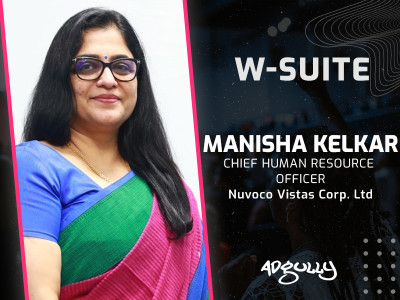Work-life balance seems like a fad to me: Hetal Khalsa
We, at Adgully, have always saluted and honoured women managers and leaders across diverse fields. W-SUITE is a special initiative from Adgully that has been turning the spotlight on some of the most remarkable women achievers in the M&E, Advertising, Marketing, PR and Communications industry. In the refurbished series, we seek to find out how women leaders have been managing their teams and work as well as how they have been navigating through the toughest and most challenging times brought about by the global pandemic.
The 4th edition of Women Disruptors is all set to be held in Mumbai on Monday, March 6, 2023. This initiative from Adgully endeavours to highlight the trailbrazing women leaders in India. Click here to register to attend.
Read More: Ravi Shastri shares his Art of Work Life Balance mantra for CRED's series
In conversation with Adgully, Hetal Khalsa, Co-founder & Chief Creative Officer, PivotRoots, speaks about importance of diversity and inclusion in today’s work place, elimination of biases and barriers, lessons learnt from the pandemic period, the MoSCoW Prioritisation technique, and more.
How do you think the role and scope of women leaders have widened in the current market ecosystem?
I want to celebrate the strength of women leaders today. They are becoming more and more confident and authentic with their craft. With growing recognition of the importance of diversity and inclusion in the workplace, it has led to more opportunities for women to take on leadership roles. A 2020 study by Deloitte found that companies with gender-diverse executive teams were 21% more likely to outperform on profitability and 27% more likely to have superior value creation.
More women are entering traditionally male-dominated industries and achieving positions of leadership. In the process, they have learned to overcome life-stage challenges and have a clear focus on their career growth. They are really paving the way to the top fast.
Having said that, representation of women in the boardroom still needs to get stronger. According to The Peterson Institute for International Economics, only 24% of senior management positions are held by women globally as of 2020. Only 25% of C-suite positions in the companies surveyed, according to a 2020 McKinsey & Company study, were held by women.
In addition, according to a 2020 World Economic Forum report, it will take 257 years to close the economic gender gap at the current rate of development. So, I suppose despite all the positives, we are still a long way from a competent number.
What has been your major learnings from the pandemic period?
The pandemic has been unsettling and humbling. It clearly demonstrated that life is more uncertain than we thought it was. During the toughest of times, the support of my peers, co-workers, and family enabled me to stay strong and continue to fulfil my responsibilities as a co-founder and a mother to a 3-year-old. It taught me to be empathetic and communicate effectively to support our people, our Rooters, and our clients during this challenging time.
What is your mantra for maintaining a successful work-life balance in the new normal?
Work-life balance seems like a fad to me. All it really boils down to is to push yourself to plan and prioritise work more efficiently constantly. My mantra is simply to achieve this. I use the MoSCoW Prioritisation technique, which bases four categories of initiative: must-have, should-have, could-have, won’t-have, or will-not-opt for it since it is not a priority. This identification ensures planning and prioritising tasks, which can be effective in maintaining a healthy work and personal life balance.
According to you, what makes women the best in crisis management?
Women have an edge when it comes to crisis management. The role that a woman plays at her workplace or at home shows her endurance and willingness to deal with both aspects of her life. The ability to multitask, empathise and understand people and their perspectives, and address the concerns of the stakeholders involved, including the employees, gives them an edge over others when there is a personal or professional crisis.
Also, women tend to be more collaborative in their leadership style, which can be helpful in building support and alignment among a team during a crisis. Studies have shown that diversity in leadership leads to more effective decision-making, which is crucial in a crisis.
What are the five most effective leadership lessons that you have learned?
In my experience of leading and growing a team for the last 7 years, developing people skills and a way to communicate with team and peers effectively will always top my list.
- It is necessary to feel insecure from time to time to grow professionally and personally. That is when you have full concentration on the pedal. The moment you get in cruise control mode (comfort zone), you don’t fight the odds. This is the biggest growth lesson that I have learned
- Focus on the process, not the output. Don’t get hung on to the results (Failure or success). The way we think affects the decisions we make. Hence, it is important to crave an approach and a process that helps to succeed.
- While we ladies may be used to handling everything ourselves, to be an effective leader, it is ideal to learn to trust and delegate tasks to the teams that we are building and this is only possible when you know your people’s strengths and weaknesses.
- Finding mentors and sponsors who can guide and support you as a woman leader as you navigate the challenges of leading an organisation can be incredibly valuable.
- Leadership means mastering yourself. It can only happen when you self-assess. Like the game of poker, you should know when to make a call or when to fold. You also need to acknowledge when the landscape has shifted, then you need to make a shift yourself. Make Good Decisions.
Gender sensitivity and inclusion in the new normal – how can organisations effectively encourage and groom women leaders in challenging times?
Every organisation, especially a start-up, that intends to build an inclusive and diverse culture should actively work to eliminate any biases or barriers that might prevent women from advancing to leadership positions. Mentoring and coaching programmes should be offered to help women to work and learn with knowledgeable leaders who are willing to offer support and guidance.
Organisations should establish metrics to track progress on diversity and inclusion and use that data to identify areas that need more consorted work and effort from the organisation.
Finally, we at PivotRoots lead by example. We have a 50:50 ratio in the founding members. As an organisation, our ratio is 60:40, which I agree is still not there, but we are taking conscious steps to reach the goal to be able to have a stronger women presence in the team.
















Share
Facebook
YouTube
Tweet
Twitter
LinkedIn